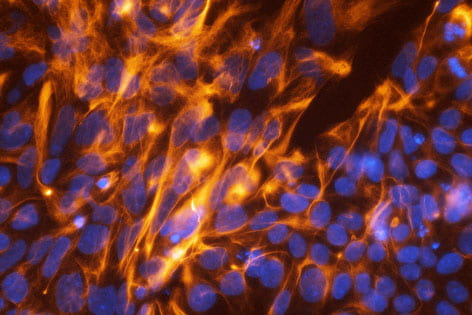What Obama’s presidency means to UCI research
Barack Obama swept into the presidency on a platform of change, one that includes a number of scientific policy and research issues. As a major research university, UC Irvine is deeply involved in some of these key areas – stem cells, global warming and alternative energy, to name a few. Research vice chancellor Susan Bryant discusses how changes made in Washington, D.C., and Sacramento, especially during the current economic crisis, will impact research efforts at UCI.

Barack Obama swept into the presidency on a platform of change, one that includes a number of scientific policy and research issues. As a major research university, UC Irvine is deeply involved in some of these key areas – stem cells, global warming and alternative energy, to name a few. Changes made in Washington, D.C., and Sacramento, especially during the current economic crisis, may profoundly impact a campus that annually brings in some $250 million in federal and state research grants and contracts. Research vice chancellor Susan Bryant leads an office that works with UCI faculty to apply for and administer myriad federally and state-funded research projects. She offers her insights.
Q: What changes in science policy and research will be ushered in by the Obama presidency?
A: Despite the appalling state of the economy, for several reasons I am more encouraged than I have been for many years about the prospects for American science. The stimulus package prominently mentions science, innovation, technology, startups and incubation; the new administration sees the critical connection between investment in scientific research and economic stimulus and job creation; and global warming will be addressed by investing in clean energy research and manufacturing.
Most encouraging is the selection of highly respected scientists for government posts and as advisors. This speaks to Obama’s judgment and his understanding that challenging problems need to involve the smartest, best-educated thinkers on the planet.
Q: How will UCI’s stem cell research efforts be affected if Obama lifts the ban on using new human embryonic stem cell lines?
A: It appears very likely that Obama will lift the Bush ban. UCI has established itself as a world leader in stem cell research and is making a significant impact on the field. Its faculty has competed successfully for more than $50 million from the California Institute for Regenerative Medicine for stem cell training, research and facilities, including $27.2 million for the construction of Sue and Bill Gross Hall, which will house our stem cell program. A spinal cord injury therapy developed here, which enabled paralyzed rats to walk again, is the basis of the world’s first embryonic stem cell study in humans.
Because CIRM-sponsored stem cell research is not subject to the Bush ban, lifting it will not change greatly the scope of research at UCI. Nevertheless, lifting the ban will allow a full range of stem cell research to be funded by the National Institutes of Health and other federal agencies. I anticipate California scientists will be very competitive if these funds become available because they have already benefited from establishing research programs, training the next generation of scientists and building state-of-the-art facilities with CIRM funds.
Q: What other research areas may benefit from the Obama administration?
A: I hope the NIH budget for biomedical research will be augmented to offset the dreadful decline we’ve seen in the last five years. This is important both to maintain the biomedical sciences at research universities and to widen the pipeline of new treatments for ailments ranging from cancer and degenerative diseases to infectious diseases and global pandemics. And, it is almost a certainty that funding for alternative energy and global warming research will increase.
Q: How is the recession impacting federal budget appropriations for medical and scientific research?
A: Although almost all of our faculty members experience great difficulty getting funded in this competitive arena, UCI has not seen a reduction in total research funding, despite the declining NIH budget and poor funding levels at other agencies. This is a tribute to the excellence and persistence of these professors and the scientific work force they employ. It is also a tribute to the research development professionals here who help coordinate substantial funding request submissions that would not be attempted by individual faculty members.
Q: What about state budget difficulties and mounting deficits in California?
A: The problems with the California budget will hurt UCI research in fundamental ways. Funds for recruiting new faculty will be restricted when core operations need to be the priority. Also, the state has terminated many research contracts over the last couple of months, stranding projects without funds to continue.
Q: How is UCI meeting the science and technological challenges brought about by a new administration?
A: UCI is well-positioned to address our country’s scientific and technological needs. Our campus has long been a leader in research on the environment and fuel cells and has a wide array of exciting research in global climate change, energy, water, sustainable resources and other vital related fields. UCI also is developing novel biomedical devices and nanomaterials, and addressing transportation and infrastructure issues.
Recently created centers in systems biology, chemical bonding and hearing research are producing exciting results, and a number of new offerings in the health sciences add to existing strengths in biomedical research. Our researchers also are increasing efforts to translate basic biomedical discoveries into clinical applications that help cure human illness.